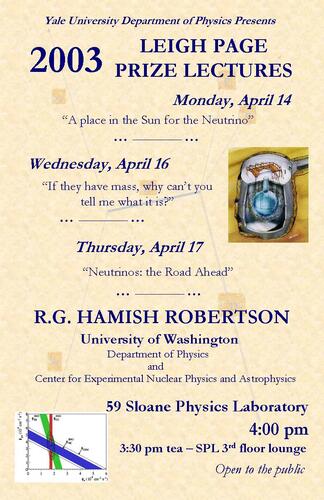
the Yale Physics 2003 Leigh Page Prize Lectures were given April 14th, April 16th, and April 17th by R. G. Hamish Robertson from the University of Washington, Department of Physics and Center for Experimental Nuclear Physics and Astrophysics.
April 14, 2003 - “A place in the Sun for the Neutrino”
One of the most intriguing and enduring puzzles of modern physics has been the solar neutrino problem, the shortfall of neutrino flux seen experimentally compared to that expected from solar models and standard-model physics. The problem has now been conclusively resolved in favor of well-understood astrophysics and novel particle physics. The resulting implications for neutrino oscillations and mass dovetail neatly with experiments on atmospheric neutrinos and reactor antineutrinos, leading to an elegant but unexpected pattern.
April 16, 2003 - “If they have mass, why can’t you tell me what it is?”
That neutrinos have mass is no longer in question, but just what the mass is remains elusive. That is because oscillation experiments fix only the product of an average mass and a mass difference. Unravelling the two requires completely different kinds of experiments. Gradually the vise is being tightened, and the mass of the heaviest neutrino is pinned down to within about an order of magnitude.
April 17, 2003 - “Neutrinos: the Road Ahead”
There is now good reason to hope for much more detailed information about the neutrino and its role in the universe. The mass and mixing parameters are confined in most cases, with upper and lower limits experimentally established. We still know nothing about the difference between neutrinos and antineutrinos (are they the same particle just spinning in opposite senses?), we do not know if neutrinos respect the symmetry of CP and we wonder if they may have had a hand in giving the universe its slight but all-important bias toward matter.
The Leigh Page Prize Lecture series are given each year by a distinguished physicist in honor of Leigh Page who received his PhD in Physics from Yale in 1913. He was later acting Chair and Director of the Sloane Physics Laboratory. Professor Page devoted his time to teaching (mostly graduate classes), research, and writing several textbooks. Since 1967, several speakers in the Leigh Page Prize Lecture series have later received Nobel Prizes and other and notable awards. In connection with the lecture series, a prize is offered to first year graduate students in recognition of their fine academic record and for the promise of important contributions to the field of physics.